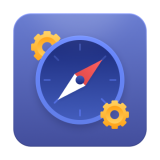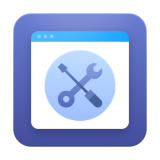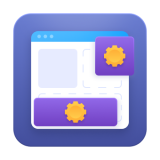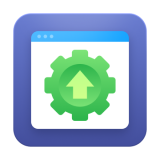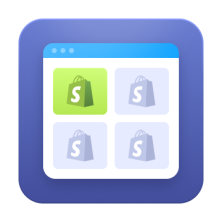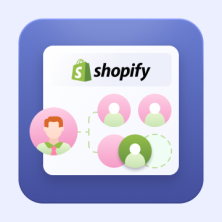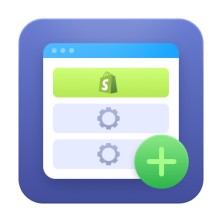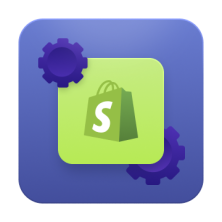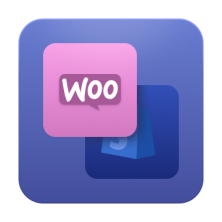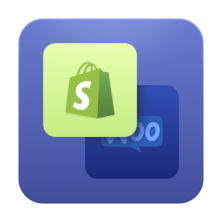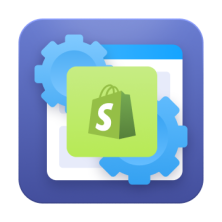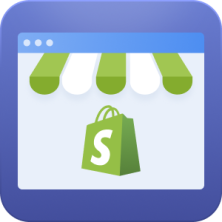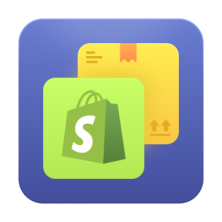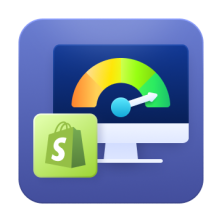Shopify has long been considered a great way to take your business online. From its humble beginnings, it created an opportunity for small businesses to create another delivery method and reach scale past their local community and geographical barriers.
Global B2B e-commerce sales are projected to reach a staggering $20.9 trillion by 2027, representing a CAGR of 17.5%. There is a huge global opportunity for Shopify B2B e-commerce to reach new customers, boost your bottom line, and increase your customer-centric excellence. Although this golden opportunity has presented itself, getting started can feel daunting and overwhelming.
Choosing the right platform from the start is crucial, and Shopify is a great place to begin. This comprehensive guide will explore Shopify B2B examples, Shopify B2B pricing, and the B2B capabilities that allow you to unlock your businesses' full online potential.
What Is a Shopify B2B Store?
Although Shopify itself may not need an introduction, a Shopify B2B store is an online platform designed to help you conduct business transactions smoothly. Unlike traditional B2C (business-to-consumer) stores, B2B platforms cater to wholesale orders, complex pricing structures, and unique customer needs.
As a B2B business, you have unique needs that exceed customer interaction and service. Businesses are more than likely to purchase from you for the long term, especially if you are supplying them with a constant stream of materials that are fundamental to their services and products.
You can use Shopify as a digital catalog or showroom, allowing you to showcase your products to a targeted audience of other businesses. Shopify provides you with all the tools and functionalities to manage customer accounts, create custom catalogs, and streamline the B2B buying journey.
Is Shopify Good For B2B?
Shopify is a powerful e-commerce platform for businesses of all sizes, and Shopify's various plans cater to everyone.
While traditionally known for its retail and B2C strengths, Shopify has invested heavily in developing strong B2B features to encapsulate a larger market.
Here's why Shopify could be a perfect fit for your B2B needs:
- Scalability. Whether you're a small startup or a well-established brand, Shopify's flexible platform scales with your business.
- Ease of Use. Even without extensive technical expertise, you can set up and manage your B2B store on Shopify's user-friendly interface.
- Extensive App Marketplace. Expand your B2B functionality with thousands of apps available on the Shopify App Store. Something as small as an auto poster can make your life easier, and something as large as a CRM integration can dramatically change the course of your business for the better.
- Cost-Effectiveness. Unlike enterprise-level e-commerce solutions, Shopify offers a cost-effective way to establish your B2B online presence. Flexible pricing plans cater to various business needs.
Shopify B2B Store Pricing
Shopify offers several main pricing plans for online stores, with additional features available through add-ons and apps. Depending on where you are in your business maturity, you may want to take advantage of their promotional offers for the first month, at a reduced rate as low as $1 to begin.
After the promotional month, here's what you can expect:
- Basic Shopify ($29/month) – Ideal for businesses starting their online journey. Offers core functionalities like product listings, customer management, and a single staff account.
- Shopify ($79/month) – Provides everything in Basic Shopify, plus additional features like discount codes, abandoned cart recovery, and multiple staff accounts.
- Advanced Shopify ($299/month) – The most comprehensive plan, offering advanced reporting, lower transaction fees, and the ability to create custom carrier-calculated shipping rates.
Please note that these plans are Shopify's standard plans and are usually catered to by traditional e-commerce stores that sell products and help make both the buyer and seller journey easier.
While these functionalities may have everything you need, they do not have any dedicated B2B functionalities. Shopify Plus offers a customized approach, including a B2B-centric model. For pricing information on Shopify Plus, you'll need to contact Shopify directly, as the plans are highly individualized.
Shopify B2B Features
Shopify itself has a ton of great features that make e-commerce a breeze. Stores are easy to create and can be customized as specifically or generally as you like, depending on the technical investment you require.
Shopify offers an app marketplace, both free and premium that makes the buyer's journey easier. Integration with dropshipping services, email marketing, and abandoned cart recovery, for example, are great ways to improve your bottom line.
While core features are available across all Shopify plans, here are some specific functionalities tailored for B2B businesses on Shopify Plus:
- Customer Accounts & Permissions. You can create dedicated customer accounts with customizable permissions for different buying teams within an organization.
- Custom Pricing & Discounts. Set up tiered pricing structures, volume discounts, and minimum order quantities to cater to your B2B pricing strategies.
- Quotes & Order Approvals. Generate quotes for potential customers and implement approval workflows for complex orders.
- Dedicated Customer Support. Shopify Plus offers priority customer support for your B2B needs.
Read More: B2B vs. B2C Pricing Strategies
How to Get Started in Shopify B2B?
Launching your B2B journey on Shopify is an exciting step. While this can seem complicated, we've compiled a list of 5 goals broken down into bite-sized steps to get you started:
1. Define Your B2B Strategy
First, you must understand your audience. Who are you selling to? What are their pain points? Tailor your products and marketing to fit their specific needs.
Once you have done this, start to define your goals. Are you aiming to boost sales, expand your customer base, or improve customer satisfaction?
Once you've got a clear vision, decide how you'll structure your store. Will you create a separate B2B shop or integrate it into your existing store?
These initial steps will set the foundation for your B2B success.
2. Set Up Your Shopify Store
You'll need to choose the right tools for the job. Select a Shopify plan that fits your business size and needs. Shopify Plus offers advanced features for larger B2B operations. Design a website that reflects your brand and caters to business customers.
Don't forget to include essential pages like 'About Us', 'Contact Us,' and 'Shipping & Returns' to provide valuable information to your customers.
Create specific landing pages for your products so that they are unique and compelling and make the customer want to purchase/
3. Configure B2B Features
Make your customers feel at home. Set up separate accounts for each business, with different user roles, so everyone knows their job. Offer special pricing for bulk orders or returning customers.
Let businesses pay how they like, whether on credit or with a purchase order. Shopify plus helps you do this. Try to be as flexible as possible and include all payment options, including newer inventions such as Apple Pay.
Need extra approval for big orders? No problem. Create a system that works for you. Organize your products into easy-to-find catalogs, and always know what's in stock. Don't take on more business risk than you need to.
4. Optimize for B2B Customers
Make it easy for your customers. Precise product info and simple navigation are key. Let them buy in bulk without any hassle, and make it easy to add recurring purchases for materials or equipment that they'll need regularly.
Consider incentive plans and discounts for customers who wish to form a long-term partnership with your business.
Have a dedicated team ready to help businesses with their needs. Finally, create marketing that speaks directly to businesses and drives sales.
5. Testing and Launch
Before you open the virtual doors, make sure everything works correctly. Test every button, every page, and how it looks on phones.
More than half of all online purchases (53%) are made through mobile, and this number is expected to increase.
Ask potential customers what they think and make changes based on their feedback. Once you're ready, launch your store and keep a close eye on how it's doing.
Improve, improve, improve! The job isn't done now that you've launched. Use this framework, take feedback, and implement good customer service protocols.
Successful Shopify B2B Store Examples
Learning from successful businesses can be invaluable. Here are two Shopify B2B examples to inspire your own store and use as a template or case study:
Microfiber Wholesale

This store showcases how a niche B2B business can thrive on Shopify, offering a wide range of microfiber products with clear product categories and pricing structures.
It's also a great example of selling services via a Shopify B2B wholesale service.
The Goulet Pen Company

The Goulet Pen Company’s B2B Shopify store has a dedicated wholesale section tailored for retailers and corporate clients, offering detailed product listings and an intuitive order management system. This focus on personalization and exceptional customer service ensures a seamless purchasing experience, setting a benchmark for B2B e-commerce on Shopify.
Mac Tools

A well-known brand, Mac Tools, uses Shopify to manage its B2B operations, demonstrating how established businesses can leverage the platform without needing to start from scratch.
Benefits of a Shopify B2B store
Investing in a Shopify B2B store offers numerous advantages.
A Shopify B2B store turbocharges your business. It makes everything easier, from managing orders to happy customers. Say goodbye to paperwork and hello to streamlined operations.
Plus, you'll have a crystal-clear view of your customers and what they want. Watch your business grow without limits, all while saving money and making your customers super happy.
Mistakes to Avoid for Shopify B2B Stores
While Shopify is a powerful platform, common pitfalls can hinder your B2B success. Here are some mistakes to avoid:
- Neglecting User Experience. A clunky or confusing website can drive customers away. It doesn't need to win a beauty pageant, but it does need to be elegant and user-friendly.
- Ignoring Mobile Optimization. With the increasing use of smartphones, always test to see if it's responsive on mobile.
- Overlooking Security. Protect your customers' sensitive data with robust security measures, including SSL certificates and secure payment gateways.
- Ignoring Customer Support. Customers are very understanding if you're proactive about any issues, but they will make the problem bigger if you ignore them.
- Failing to Leverage Integrations. Shopify apps are there for a reason. No need to reinvent the wheel. Start with a few that'll make your life easier.
- Disclosures and Legal. Make sure to write a detailed disclosure page and add the proper tax information to your store. You can have a thriving business, but you'll be shut down eventually if you aren't onside.
Know When to Call in a Professional
Shopify is one of the world's largest retailers, and it offers powerful digital tools that can help you optimize and streamline your business. It has grown to become one of the largest e-commerce sites, with omnichannel presence capabilities and a wide range of capabilities to improve the B2B experience.
The issue is knowing how to maximize Shopify's potential so that you can make it work better for you.
At Amasty, we offer a comprehensive range of Shopify services, from custom development to migration and maintenance, so that you can focus on what you do best when running your business.
We pride ourselves on delivering fast, efficient, scalable solutions that drive results. From our initial consultation, we will provide ongoing support. We're committed to your success. Let us handle the technical complexities while you focus on growing your business!
Frequently asked questions
Absolutely! Shopify offers features to cater to both B2B and B2C customers. You can create separate storefronts or use customer segmentation to manage different customer groups effectively.
Shopify offers tiered pricing, volume discounts, and custom pricing options to accommodate complex B2B pricing structures. Additionally, there are third-party apps available to enhance your pricing capabilities further.
Shopify supports a wide range of payment gateways, including credit cards, PayPal, and alternative payment methods. You can also offer payment terms like net 30 or purchase orders for B2B customers.
Yes, Shopify offers various integration options with popular ERP systems. This allows for better data sync.
Focus on providing excellent customer service, personalized experiences, and loyalty programs tailored to B2B customers. Use real-time customer data to identify opportunities for both cross-selling and upselling.



